More actions
No edit summary |
No edit summary |
||
| (3 intermediate revisions by 2 users not shown) | |||
| Line 7: | Line 7: | ||
|mainpage = Part of [[Guilds]] lore. | |mainpage = Part of [[Guilds]] lore. | ||
|}} | |}} | ||
Guilds in contrast to Knighthood is a more universal concept that spans multiple cultures and peoples. Guilds concentrate people with likeminded ideologies or work employment into groups that specialize their work to a high degree. It allows Characters to fulfill a specific niche in Roleplay that cannot otherwise be materialized with Roleplay alone. Guilds are a very good way to get involved in pre-existing groups and activities, guaranteeing people to connect to and a reason to log on, but more importantly creating connections with other players who can offer resources for roleplay access. Unlike Knighthood, Guilds do not have clearly defined jobs, nor do they have a rank-up system, but still provide a framework to add to roleplay. | Guilds in contrast to Knighthood is a more universal concept that spans multiple cultures and peoples. Guilds concentrate people with likeminded ideologies or work employment into groups that specialize their work to a high degree. It allows Characters to fulfill a specific niche in Roleplay that cannot otherwise be materialized with Roleplay alone. Guilds are a very good way to get involved in pre-existing groups and activities, guaranteeing people to connect to and a reason to log on, but more importantly creating connections with other players who can offer resources for roleplay access. Unlike Knighthood, Guilds do not have clearly defined jobs, nor do they have a rank-up system, but still provide a framework to add to roleplay. For a less committed version of Guilds, please read [[Societies]], which are meant merely to give players reasons to interact with each other, but have no additional obligations. For a more combat and rule-heavy approach, consider reading [[Knights]] which create structured military orders with behavior codes. | ||
==Joining a Guild== | ==Joining a Guild== | ||
Joining a Guild can either be done as backstory, or In-Character. Guilds are less of a strict commitment than Knighthood, but they still have a base-requirement of certain things a Character can't or should do. There is no training period or introduction period, when a person joins a Guild they are already a fully fledged member. Theoretically there are no ranks within a Guild, and the leader of the Guild will always be an off-screen Event NPC, but players are free to create hierarchies within their Guilds themselves. While it is possible to join a Guild at any point in time, keep in mind that some Guilds require specific Character designs. In order to join such a Guild, you will need to change your Character's Proficiency spread, likely. Switching Guilds is possible and has less of an impact than changing Knight Orders, but still requires communication to Lore Staff. If you join or create a Guild Character, you must register your Character with Lore Staff in a Ticket, notifying the Character Application and what Guild they are becoming a member of. Guild membership and other occupation-based systems (like Knighthood) are mutually exclusive, that is to say, a Knight cannot be a member of a Guild and vice versa. Guild members can however work with Knights, for example, a Guild of Scribes member can work with the Lothar Order if they have purist leanings. | Joining a Guild can either be done as backstory, or In-Character. Guilds are less of a strict commitment than Knighthood, but they still have a base-requirement of certain things a Character can't or should do. There is no training period or introduction period, when a person joins a Guild they are already a fully fledged member. Theoretically there are no ranks within a Guild, and the leader of the Guild will always be an off-screen Event NPC, but players are free to create hierarchies within their Guilds themselves. While it is possible to join a Guild at any point in time, keep in mind that some Guilds require specific Character designs. In order to join such a Guild, you will need to change your Character's Proficiency spread, likely. Switching Guilds is possible and has less of an impact than changing Knight Orders, but still requires communication to Lore Staff. If you join or create a Guild Character, you must register your Character with Lore Staff in a Ticket, notifying the Character Application and what Guild they are becoming a member of. Guild membership and other occupation-based systems (like Knighthood) are mutually exclusive, that is to say, a Knight cannot be a member of a Guild and vice versa. Guild members can however work with Knights, for example, a Guild of Scribes member can work with the Lothar Order if they have purist leanings. Guild Membership can also be revoked, if a Member acts contrary to the established norms of said Guild. | ||
==Guild Orders== | ==Guild Orders== | ||
Latest revision as of 13:27, 1 August 2024
| Expanded Guilds Lore | |
|---|---|
| Part of Guilds lore. |
Guilds in contrast to Knighthood is a more universal concept that spans multiple cultures and peoples. Guilds concentrate people with likeminded ideologies or work employment into groups that specialize their work to a high degree. It allows Characters to fulfill a specific niche in Roleplay that cannot otherwise be materialized with Roleplay alone. Guilds are a very good way to get involved in pre-existing groups and activities, guaranteeing people to connect to and a reason to log on, but more importantly creating connections with other players who can offer resources for roleplay access. Unlike Knighthood, Guilds do not have clearly defined jobs, nor do they have a rank-up system, but still provide a framework to add to roleplay. For a less committed version of Guilds, please read Societies, which are meant merely to give players reasons to interact with each other, but have no additional obligations. For a more combat and rule-heavy approach, consider reading Knights which create structured military orders with behavior codes.
Joining a Guild
Joining a Guild can either be done as backstory, or In-Character. Guilds are less of a strict commitment than Knighthood, but they still have a base-requirement of certain things a Character can't or should do. There is no training period or introduction period, when a person joins a Guild they are already a fully fledged member. Theoretically there are no ranks within a Guild, and the leader of the Guild will always be an off-screen Event NPC, but players are free to create hierarchies within their Guilds themselves. While it is possible to join a Guild at any point in time, keep in mind that some Guilds require specific Character designs. In order to join such a Guild, you will need to change your Character's Proficiency spread, likely. Switching Guilds is possible and has less of an impact than changing Knight Orders, but still requires communication to Lore Staff. If you join or create a Guild Character, you must register your Character with Lore Staff in a Ticket, notifying the Character Application and what Guild they are becoming a member of. Guild membership and other occupation-based systems (like Knighthood) are mutually exclusive, that is to say, a Knight cannot be a member of a Guild and vice versa. Guild members can however work with Knights, for example, a Guild of Scribes member can work with the Lothar Order if they have purist leanings. Guild Membership can also be revoked, if a Member acts contrary to the established norms of said Guild.
Guild Orders
Guilds are split between a variety of Orders which all represent some kind of central theme or thought. Below are listed all available Guild Orders, and a very quick summary of their work, while also linking to their individual Pages for more detail.
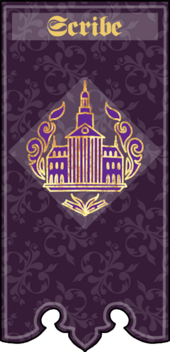
|
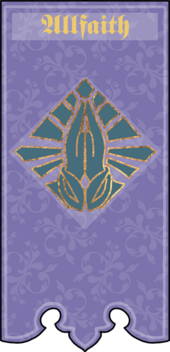
|
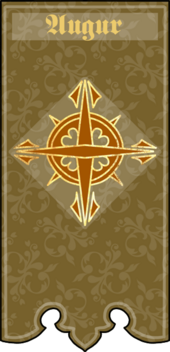
|
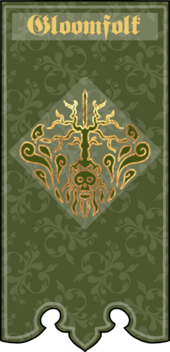
|
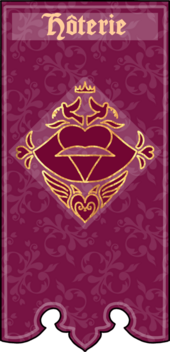
|
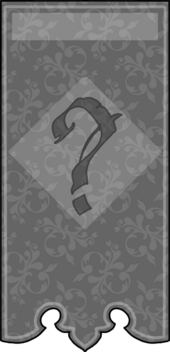
|

|
|---|---|---|---|---|---|---|
| The Scribe Order is a Guild of scribes, historians, scholars and bureaucrats, who center around the recording of history and intellectual problems. | The Allfaith Order is a Guild or priests, religious figures, preachers, and missionaries, that loosely allies all priest figures for religious freedom. | The Augur Order is a Guild for merchants, commerce, traders, explorers and inventors, that seeks to improve the technology and finances of the Empire. | The Gloomfolk Order is a Guild of the inhabitants and sympathizers of Gloomrot, who protect it against incursions, and uphold its unique culture. | The Hoterie Order is a Guild for entertainers, courtesans, charmers, spies, and informants, who use their body and mind to capture others for power. | This is a placeholder for a future Guild. If you have a unique idea or suggestion, you are welcome to submit them in a Lore Staff Ticket on Discord. | This is a placeholder for a future Guild. If you have a unique idea or suggestion, you are welcome to submit them in a Lore Staff Ticket on Discord. |